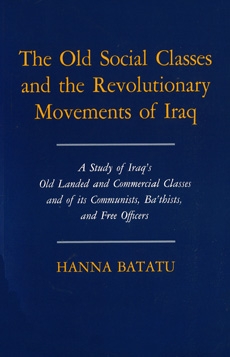Contents
Preface / xxi
List of Tables / ix
List of Illustrations / xvii
List of Maps / xix
Book One the Old Social Classes
Part I Introduction
1 The "Old Social Classes": Practical and Theoretical Clarifications; Applicability of Concept; Difficulties of Analysis / 5
2 Of the Diversity of Iraqis, the Incohesiveness of Their Society, and Their Progress in the Monarchic Period toward a Consolidated Political Structure / 13
3 The Geographic Distribution of the Principal Racial-Religious Groups and Relevant Causative Factors / 37
4 Some Religious-Class and Ethnic-Class Correlations / 44
Part II The Main Classes And Status Groups
5 The Mallaks or Landowners / 53
6 The Shaikhs, Aghas , and Peasants / 63
7 The Sadah / 153
8 The Old "Aristocracy" of Officials / 211
9 The ChalabTs and the Jewish Merchants and Merchant-Șarrefs / 224
10 The Crown and the Ex-SharTfian Officers / 319
Book Two The Communists from the Beginnings of Their Movement to the Fifties
Part I Beginnings in the Arab East
11 The Earliest "Levelers"; the Armenian Hentchak; the Jewish Communists; and the Communist International / 367
Part II Beginnings in Iraq
12 Husain ar-Rahhal, aș-Șahifah Group, and at-Tadjimun Club / 389
13 Pyotr Vasili and the Bas rah and Nii~iriyyah Communist Circles / 404
14 The Founding of the Iraqi Communist Party / 411
15 Two Iraqis -Three Sects / 434
16 Beginning, again; or the Communists in the Period of the / 434
Coups d'Etat (1936-1941) / 439
Part III Causes
17 Of the General Causes That Made for the Increase of Communism in the Two Decades before the July Revolution / 465
Part IV Fahd and the Party (1941-1949)
18 Fahd / 485
19 Toward a Tightly Knit, Ideologically Homogeneous Party / 493
20 New Situations, New Approaches / 523
21 The Arrest of Fahd and after / 537
22 Al-Wathbah / 545
23 The Disaster; the Death of Fahd on the Gallows; the "Children Communists" / 567
24 Fahd, the Communist International, the Soviets, the Syrian Communists, and the People's Party / 574
25 The Communists and the Question of Pa les tine / 597
26 The Character, Scope, and Forms of Party Activity / 604
27 The Organization, Membership, and Social Structure of the Party (1941-1949) / 628
28 The Finances of the Party / 653
Part V The Party in the Years 1949-1955, or the Period of the Ascendancy of the
Kurds in the Party
29 Baha'-ud-din Nuri Rebuilds the Party / 657
30 The Intifadah of November / 666
31 More and More Extremism, Less and Less Sense / 671
32 A Defeat for the Party, or the Birth of the Baghdad Pact / 679
33 A Bit of Forgotten History, or the Tragic Occurrences atthe Baghdad and Kut Prisons / 690
34 A Debate. on Religion / 694
35 The Composition of the Party (1949-1955) / 699
Book Three The Communists, the Ba'thists,
and the Free Officers from the Fifties to the Present
36 The Communist Helm Changes Hands, the Communist Ranks Close / 709
37 The New Ștrong Men of the Communist Party: Husain Ahmad ar-Radi, 'Amer 'Abdallah, and Jamal a l-Haidari / 712
38 The Ba'th of the Fifties: Its Origins, Creed, Organization, and Membership / 722
39 The Arabization of the Communist Party's View and the Risings at Najaf and Hayy in 1956 / 749
40 The Formation of the Supreme National Committee, February 1957 / 758
41 The Free Officers, the Communists, and the July 1958 Revolution / 764
42 "Sole Leader," Dual Power / 808
43 Mutual Antagonism, Mutual Defeat / 861
44 Mosul, March 1959 / 866
45 The Flow / 890
46 Kirkuk, July 1959 / 912
47 The Ebb 922
48 The Self-Flagellation / 926
49 The Recovery / 931
50 The Bogus Party / 936
51 From Pillar to Post / 942
52 The Ba'thists Make Preparation, the Communists Give Warning / 966
53 "The Bitterest of Years" / 974
54 The Composition and Organization of the Communist Party (1955-1963) / 995
55 The First Ba'thT Regime, or toward One-Party Rule / 1003
56 The Younger 'Aref, the Na!llirites, and the Communists / 1027
57 Under the Elder 'A.ref, or the Rift in the Communist Ranks / 1062
58 The Second Ba'thi Regime / 1073
Conclusion
59 Conclusion / 1113
Appendix One
Earliest Bolshevik Activities and Contacts
A. "0 Moslems! Listen to This Divine Cry!" / 1137
B. The Bolsheviks and the 'Ulemii' of the Holy Cities / 1141
C. The Bolsheviks, the Comintern, and the Arab Nationalists / 1148
D. An Overture in Teheran / 1156
Appendix Two. Supplementary Tables
Bibliography / 1231
Glossary / 1253
Index I: Names of Families and Tribes / 1259
Index II: Personal Names / 1262
Index III: Subjects / 1272
| 